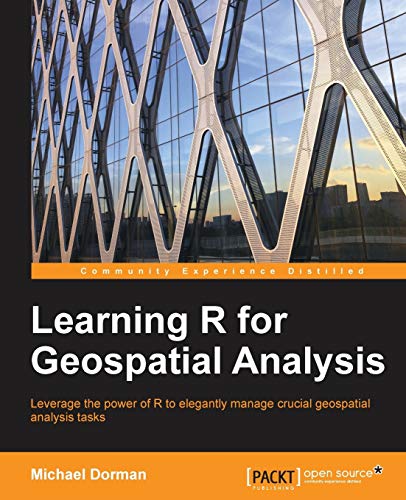Michael Dorman
Learning R for Geospatial Analysis
- Write powerful R scripts to manipulate your spatial data
- Gain insight from spatial patterns utilizing R's advanced computation and visualization capabilities
- Work within a single spatial analysis environment from start to finish
This book is intended for anyone who wants to learn how to efficiently analyze geospatial data with R, including GIS analysts, researchers, educators, and students who work with spatial data and who are interested in expanding their capabilities through programming. The book assumes familiarity with the basic geographic information concepts (such as spatial coordinates), but no prior experience with R and/or programming is required. By focusing on R exclusively, you will not need to depend on any external software—a working installation of R is all that is necessary to begin.
What You Will Learn- Make inferences from tables by joining, reshaping, and aggregating
- Familiarize yourself with the R geospatial data analysis ecosystem
- Prepare reproducible, publication-quality plots and maps
- Efficiently process numeric data, characters, and dates
- Reshape tabular data into the necessary form for the specific task at hand
- Write R scripts to automate the handling of raster and vector spatial layers
- Process elevation rasters and time series visualizations of satellite images
- Perform GIS operations such as overlays and spatial queries between layers
- Spatially interpolate meteorological data to produce climate maps
R is a simple, effective, and comprehensive programming language and environment that is gaining ever-increasing popularity among data analysts.
This book provides you with the necessary skills to successfully carry out complete geospatial data analyses, from data import to presentation of results.
Learning R for Geospatial Analysis is composed of step-by-step tutorials, starting with the language basics before proceeding to cover the main GIS operations and data types. Visualization of spatial data is vital either during the various analysis steps and/or as the final product, and this book shows you how to get the most out of R's visualization capabilities. The book culminates with examples of cutting-edge applications utilizing R's strengths as a statistical and graphical tool.
- ISBN
- 1783984368 / 9781783984367
- Pages
- 364
- Weight
- 27.2 oz.
- Dimensions
- 7.5 x 0.8 in.
Enjoy reading Learning R for Geospatial Analysis? You may also like these books
-

Michael Doran
Ike's Gamble: America's Rise to Dominance in the Middle East
Paperback (Free Press Oct. 24, 2017) -

Michael Dorman
Witch hunt: The underside of American democracy
Mass Market Paperback (Delacorte Press March 15, 1976)

